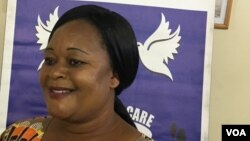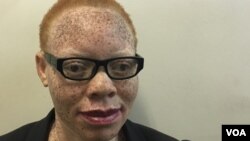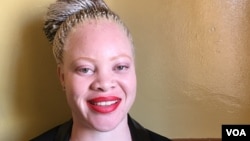Activists and government officials from around Africa will gather Friday in Tanzania for the continent's first-ever forum on albinism. The event is sponsored by the United Nations, which sounded the alarm earlier this year about a spike in attacks on albinos in Malawi.
In nearby Zimbabwe, albino activists say community outreach is working to dispel dangerous myths and discrimination, but the battle is far from over.
Loveness Mainoti's husband divorced her in 2008 after she gave birth to her second child with albinism. She is now a member of the Albino Charity Organization of Zimbabwe, which offers encouragement to parents of albino children.
"I am now giving counseling to others, and courage to love their children and to accept their condition as they are,” Mainoti said, adding that the group is trying to counter the myths surrounding albinism. “It is not a misfortune. It is not a result of prostitution, neither is it a result of witchcraft.”
Official statistics show Zimbabwe, with a population of 13 million, has about 39,000 people with albinism.
The condition is characterized by a lack of pigment in the skin, hair and eyes. It is hereditary.
But albino Tapiwa Gwen Marange, 34, says more education is needed in rural areas.
"In Zimbabwe, traditional healers lie to HIV-positive men, [claiming] that if they sleep with a woman with albinism, HIV/AIDS is cured,” Marange said. “They also say women with albinism give more sexual pleasure than women who do not have albinism, which is a lie. And some people say we are a curse. … My parents are black and I am white. Some people say maybe the gods were cursing my parents."
Albinos have come under attack in neighboring Malawi and Tanzania, where some people falsely believe that charms made from albino body parts will bring good fortune or money.
"Honestly, I never knew that I was different,” said journalist Candice Mwakalyelye, an albino who is half Tanzanian. “Growing up in Zimbabwe, I was never treated any differently from other children I interacted with. I do not know whether I never treated myself differently or not. But I noticed that somebody noticed my skin color when I moved to Tanzania. That is when you would find someone down the street shouting ‘muzungu, muzungu,’ which is Swahili for murungu [white person]."
She and other activists say education plays a key role in reducing discrimination and violence against albinos.







